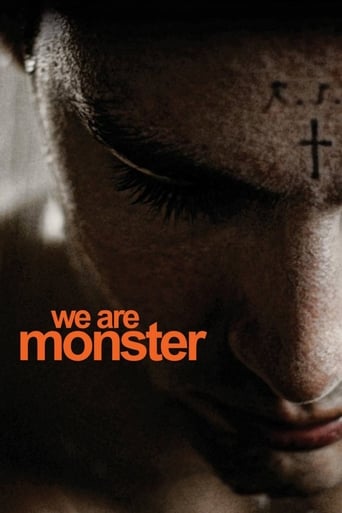Michael Ledo
Based on a true story. Habitual offender Robert Stewart (Leeshon Alexander) was placed in the same cell as Zahid Mubarek (Aymen Hamdouchi). Robert is a psychotic racist who talks to himself. The results weren't good. The film has some flashbacks to an abused childhood, but it is mostly Robert talking to himself. The film was interesting for a while, except there are only so many conversations I can watch a person have with themselves before I get bored, and this film definitely crossed the line. Did I mention Robert talks to himself?Guide: F-bomb. No sex or nudity.
in1984
8.5 of 10. The joy of a good monster film, including flaunting seemingly bad grammar at critics, but without having to suspend disbelief. This fact-based film gets you inside of a very different, and very real, Hannibal Lecter that is too pure to eat others but no less psychotic.For the filmmakers, opting to attempt to recreate the story and character rather than do a documentary, the challenge is how to create thrills, suspense, and mystery for relatively recent history. They opt to focus on the "monster" man along, to a lesser extent, his enablers and the odd youth/minors prison atmosphere of the UK.There are a few choices that make the film less interesting than it could be. For example, the monster's earlier history is relived through non-linear memories, making it hard for those unfamiliar with the person and what happened, those who are the main target of the film, to piece together the context or the horror and injustice of what happened. The writer and director needed to assume more ignorance and lack of interest in the audience.Nonetheless, you'll never look at someone talking to themselves again quite the same and it's far more entertaining than watching someone dump a bucket of their own urine over their head on a Web video, though equally disgusting.
amcobban
We Are Monster (based on real life events)will stay with you, it provokes sympathy for the victim(s) and outrage and disbelief as to why a young man is murdered within his cell at Feltham Young Offenders Institute when it could and should have been prevented.What causes the viewer considerable disquiet is the murderer's own story as we learn about his abusive childhood, at the hands of his racist, violent father, and his mother who turned away.The lead role of the protagonist is played by Leesham Alexander. I hadn't seen any of his work before, his performance was mesmerizing and compelling, drawing you in to the murderer's highly disorganised and damaged view of the world, acutely paranoid and withdrawn he finds himself within Feltham having spent previous time in other YOIs alone but sharing a cell with a young Asian man. The unfolding events are told through the murder's perspective as he struggles and stumbles toward the inevitable, horrific but avoidable end.The victim, convincingly played by another relative unknown, is a young man with a future who appears to have a rehabilitated himself is due to be released.This film is unsettling, but rightly so, if you enjoy a film which is thought provoking and challenging this is for you. I hope it does well for the writer, director and cast because the story remains highly relevant following the subsequent inquiry and the lessons not (yet) learned. Great direction from Antony Petrou and cinematography which captures the starkness of the institutions in which we place young people with little if any support. I suspect it will be uncomfortable viewing for the governor and warders/officers involved (some of whom tried to intervene and do right by their charges), as well as the Home Office and others. There is no getting away from the social and political issues highlighted.
euroGary
This is based on the case of Robert Stewart, a racist who, incarcerated in Feltham Young Offenders Institute, murdered his Asian cellmate, Zahid Mubarek. The film seeks to tell some of Stewart's back-story, as well as expose the failings at Feltham itself.Lead actor, the unusually-named 'Leeshon' Alexander, also wrote the script. And there's the problem: as an actor, he makes a fair writer; as a writer, he makes a fair actor. Most of the film has Stewart imagining he's talking to a slightly more exciting version of himself (also played by Alexander). The constant swearing and racial epithets these conversations consist of become wearing with nothing lighter to enliven the piece; even a shot of the impressively-muscled Alexander in the shower (waist upwards only I'm afraid) has to be accompanied by his 'other self' moaning about how he acquired a tattoo of Bob Marley on his arm. Secondary characters - even the victim himself, Mubarek - are barely more than sketched out; the prison guards are shown as exclusively lazy, racist, or both. As for the acting, Alexander relies too much on wide-eyed stares to convey an unhinged mind. (And, to be honest, he's rather swarthy to be convincing as a white racist - possibly that's why the entire film is shot in a strange, washed-out, unrealistic light.)The bigwig at the 2014 Edinburgh International Film Festival who introduced the film used film snob language like 'raw' and 'uncompromising'. Perhaps. But my verdict is it's a worthwhile effort, but try harder next time. Doing a socially-conscious campaigning piece is all very well, but you've got to throw the audience a bone of interest every now and again.

